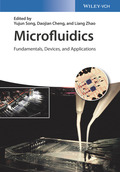Microfluidics
Fundamentals, Devices, and Applications

1. Auflage Februar 2018
544 Seiten, Hardcover
247 Abbildungen (176 Farbabbildungen)
Monographie
The first book offering a global overview of fundamental microfluidics and the wide range of possible applications, for example, in chemistry, biology, and biomedical science.
As such, it summarizes recent progress in microfluidics, including its origin and development, the theoretical fundamentals, and fabrication techniques for microfluidic devices. The book also comprehensively covers the fluid mechanics, physics and chemistry as well as applications in such different fields as detection and synthesis of inorganic and organic materials.
A useful reference for non-specialists and a basic guideline for research scientists and technicians already active in this field or intending to work in microfluidics.
1.Introduction: The Origin, Current Status and Future of Microfluidics
2.Fundamental Concepts and Physics in Microfluidics
3.Microfluidic Devices: Fabrication and Surface Modification
4.Numerical Simulation in Microfluidics and the Introduction of the Related Software
5.Digital microfluidics systems: principles, configurations, techniques, and applications
6.Microfluidics for Chemical Analysis
7.Microfluidics for Disease Diagnosis
8.Microfluidic Devices for Isolation
of Circulating Tumor Cells (CTCs)
9.Gene expression analysis on microfluidic device
10.Computational Microfluidics Applied to Drug Delivery in Pulmonary and Arterial Systems
11.Microfluidic Synthesis of Organics
12.Microfluidic approaches for design of multifunctional polymeric microparticles: from simple emulsions to complex particles
13.Synthesis of magnetic nanomaterials
14.Microfluidic Synthesis of Metallic Nanomaterials
15.Microfluidic Synthesis of Composites and Hybrids
16.Microfluidic Synthesis of MOFs and MOF Based Membranes
17.Prospective for Microfluidics
Daojian Cheng is Professor at Department of Chemical Engineering, Beijing University of Chemical Technology, China. He has been named a Fellow of the Royal Society of Chemistry. He obtained his Ph.D. Degree in Chemical Engineering from Beijing University of Chemical Technology in 2008. During 2008-2010, he worked as a Postdoctoral Research Fellow at Université Libre de Bruxelles, Belgium. Currently he has interests in theoretical study, computational design and experimental synthesis of metal clusters and nanoalloys as catalysts for renewable clean energy and environmental protection applications.
Liang Zhao is Assistant Professor at University of Science and Technology Beijing. Before that, he worked at Peking University as a postdoctoral associate (2010-2013). He received his PhD in Nanjing University in 2009. In 2014-2015, he was a visiting researcher in UC Berkeley, Prof. Luke Lee?s group. His research currently focuses on developing new microfluidic device which can be easily used to study cell patterning, tumor metastasis, tumor-stoma interactions, and organ on chip. He also works on single cell RNA-Seq in integrated microfluidic platform, which may bring some valuable merits such as high throughput and efficiency comparing with conventional way of molecular biology.


